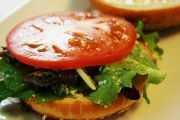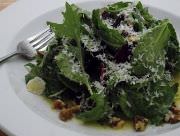About Herbs Seasoning And Spices
 Smoked Salt, Kosher Salt, Lava Salt
Smoked Salt, Kosher Salt, Lava SaltSalt
Of all the herbs seasoning and spices, salt is probably the most important, most used, most misunderstood, and most maligned ingredient in a kitchen. The hardest thing to teach new cooks is how to use salt. If you were to poll all the chefs of the world, I suspect you'd find that most would say, one of the most important things in cooking is knowing how to use salt. It is so important in cooking that we use the word salt and seasoning interchangeably.
Salt, NaCl, sodium chloride ... When used properly it doesn't make things salty it makes them taste better. Professional cooks have a saying, "Food has no flavor until you salt it." It means salt brings out the flavor of food, but it does a great deal more than just bring out or enhance the flavor of food. Salt actually suppresses disagreeable flavors and enhances agreeable flavors. In addition, it allows odorant molecules to separate from food. This is why unsalted soup has no flavor, and salting it increases its odor - a very important part of tasting. This is also the reason that salt is a component of sweet recipes, like cookies, it brings out the flavor.
Over the past decades salt has been vilified by the medical world. "Less sodium", "salt free", "season with herbs and spices", blah blah blah! Try this, On average most Japanese people consume twice the sodium of the average American, yet they have the audacity to live longer, on average.
Other herbs seasoning and spices or spice blends that are supposed to let the natural flavor of food come through, just don't work. Food tastes flat - it has no flavor, no odor, you may as well eat cardboard. People that eat a salt free diet will say our tastes have been programmed to want salt. If that's true why do we have taste receptors specifically for salt?
Not all salt is created equal. Again, if you poll those chefs, I bet you'll find that most use kosher salt. Why? It has a crystalline structure that allows better control when you are seasoning something. In other words, it falls from your fingers onto the food in a more controllable way. That and it is pure, as in nothing but salt, at least Diamond Crystal Kosher Salt is, at any rate.
Pepper
There are 5 varieties of peppercorns that come from 3 different plants.
Green, black, and white peppercorns come from the same plant. Green peppercorns are picked in the early stages of ripening, while black peppercorns are picked when the berry is halfway through the ripening stage. White peppercorns are picked when the berries are fully ripe.
Pink peppercorns come from a completely different plant, the South American pepper.
Finally, the grayish white Szechuan peppercorns come from pepper trees native to warm temperate and subtropical areas worldwide.
Getting the best flavor. Ground pepper tastes faded and dull, which it is because dried spices and seasonings lose their flavor and essential oils once they are ground. Instead, purchase whole peppercorns. When you’re ready to use them, grind them using a peppermill or crush them by hand with a mortar and pestle.
Herbs And Spices
Culinary herbs are distinguished from vegetables in that, like spices, they are used in small amounts, they provide flavor rather than substance to food, and they are used like other seasonings.
Dried spices are best when purchased in their whole form and ground for use at the time they are needed.
It takes a little time to develop a sense for herbs and spices. One of the elements to understand right away is the differences between dried herbs and fresh herbs. You can use either but you need to use them differently. For most recipes if you are using dried herbs you want to add them early in the cooking process so they have time to rehydrate and release their flavor. Dried herbs concentrate the flavors so you need to use less than you do with fresh herbs.
If you’re using fresh herbs you want to add them at the end so they maintain their color and freshness. Since they are fresh they will immediately release their flavor as they are eaten. In addition fresh herbs aren’t as intense in flavor as dried herbs so you will need to use more fresh herbs to achieve the same flavor profile.
Both dried and fresh herbs contain phytonutrients that are beneficial to health. Just like drying concentrates the flavor of herbs it also concentrates the phytonutrients.
Vinegar
Vinegar has an acidity between 4 and 6 percent. When working with acids be certain to use non-reactive cookware.
Vinegar is commonly used in food preparation, particularly in pickling processes, vinaigrettes, and other dressings. It is an ingredient in condiments like mustard and ketchup, and It often serves as a condiment, itself. Marinades often contain vinegar. In terms of shelf life, vinegar's acidity allows it to last indefinitely without refrigeration.
The principle types of vinegars are white vinegar, cider vinegar, malt vinegar, balsamic vinegar, and red and white wine vinegars. Herb vinegars are typically made with any of the above vinegars and the addition of herbs.
If you should decide to make your own herb vinegar be careful not to overload the vinegar with too many herbs or vegetables. The reason being that the acidity may not be powerful enough to prevent the growth of botulism.
Aromatic Vegetables - The Holy Trinity Of Cuisines
A vegetable used as a flavor base for cooking, usually by sweating or sautéeing. Carrots, onions, garlic, peppers, and celery are often used for this purpose in many different cuisines. If you learn the basic cooking trios, you can identify and prepare food from many cultures. This allows you to create a wide range of rich flavors from different cuisines using very few ingredients.
- Italian cuisine: onion, celery, carrot
- Creole/Cajun cuisine: celery, bell peppers, onion
- French cuisine: onion, celery, carrots
- Asian cuisine: scallions, ginger, garlic
- Indian cuisine: garlic, ginger, onion
- Cuban cuisine: garlic, bell peppers, onion
- Spanish cuisine: garlic, onion, tomato
- Latin cuisine: chilies, onion, and garlic
Fats
Though fat is not technically one of the seasonings fat is an essential part of cooking and why I included it here. Much of cooking can’t be done without fat, for example, frying, sautéing, baking, shallow frying, and pastry. For that matter, most cooking methods rely in whole or in part on fat. The one exception may be boiling. So if you want to eat all of your food boiled you can ignore fat. Otherwise you are going to have to learn to use fat.
There are principally 2 types of fat, solid fats and liquid fats. Solid fats are solid at room temperature while liquid fats remain liquid at room temperature, though liquid oils may congeal under refrigeration. Within these types of fat there is butter, hydrogenated fat, vegetable oils, seed oils, nut oils, and fruit oils.
Air, heat, and light, affect the quality and the shelf life of most edible oils, which deteriorate through oxidation to turn rancid. The oxidation process is greatly enhanced when edible oils are stored in containers that are not air tight and in areas where the oil is exposed to heat and light.
Choose oil that comes in dark containers over clear or light containers. The best containers are dark glass or tins.
Store oil in a cool, dark place like your pantry. Keep the oil away from light. Some people store their oil in the refrigerator; this may cloud the oil but it won't harm the oil. Remember to return the oil to room temperature before using it.
Use cooking oils within a few months of opening them. Remember all oils go rancid in time and after 18 months, even unopened oil should be discarded, unless the label states otherwise.
A Last Note About Herbs Seasoning And Spices
You don't need to buy those gourmet seasonings that are sold in upscale markets and now appearing at local grocery stores.
All you need to do is learn to use herbs seasoning and spices. It takes time and practice, but it is so worth it. It is one of the things that separates a good cook from an excellent cook.
Tags: herbs seasoning, gourmet seasonings




